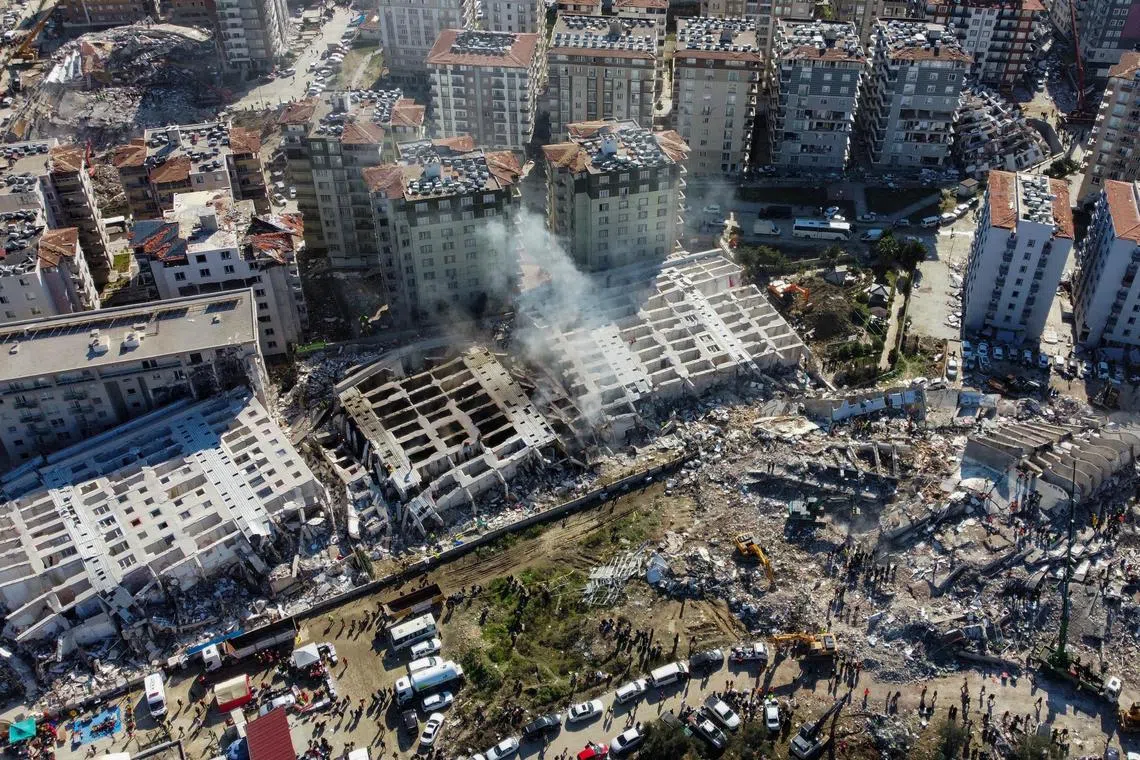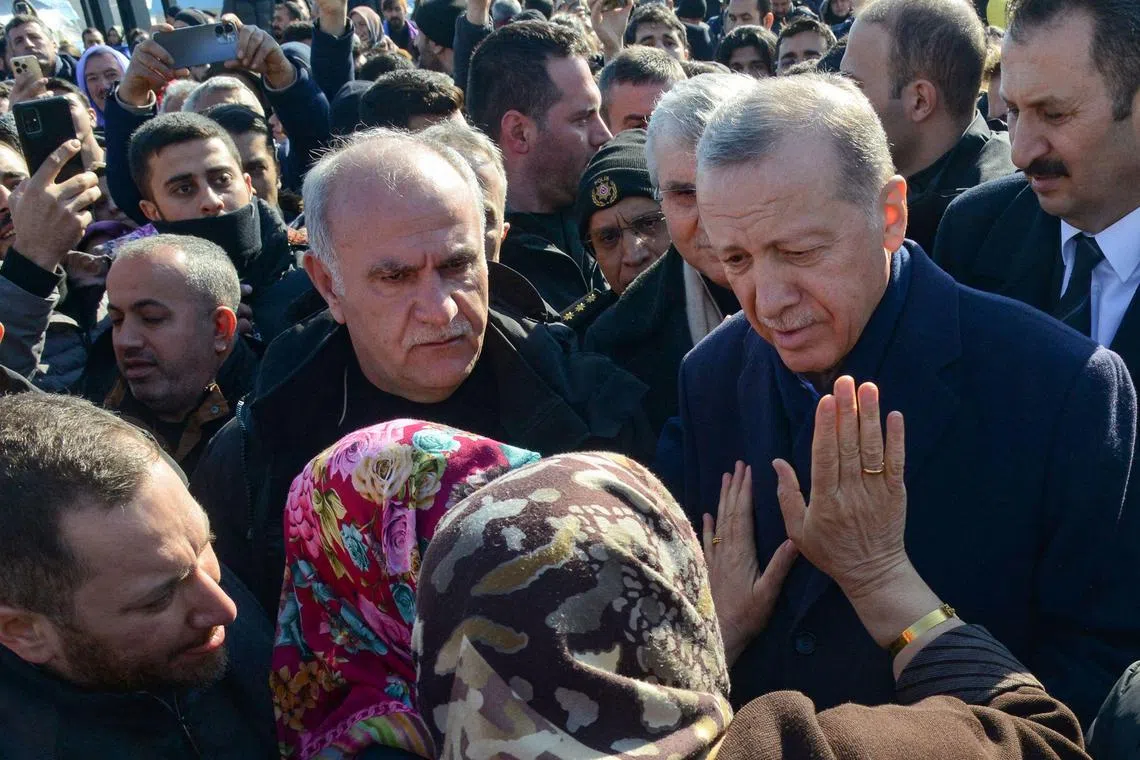Turkey rages at shoddy construction after ‘earthquake-proof’ homes topple
Sign up now: Get ST's newsletters delivered to your inbox

The wreckage of the Ronesans Rezidans - advertised as “a piece of paradise” when it opened a decade ago - has become a focus of public anger.
PHOTO: AFP
HATAY, Turkey - Residents of a luxury housing complex in southern Turkey thought their apartments were “earthquake-proof” until the structure toppled like a domino in Feb 6’s devastating earthquake, with hundreds feared dead.
Now the wreckage of the Ronesans Rezidans (Renaissance Residence), which was advertised as “a piece of paradise” when it opened a decade ago, has become a focus of public anger.
Survivors stand by the pile of debris that was the 249-unit apartment block, waiting for news of loved ones as hopes of their survival fade.
“My brother lived here for 10 years... It was said to be earthquake-safe, but you can see the result,” said 47-year-old jeweller Hamza Alpaslan.
“It was introduced as the most beautiful residence in the world. It’s in horrible condition.
“There is neither cement nor proper iron in it. It’s a real hell,” he added.
Almost two weeks after the quake that killed more than 45,000 in Turkey and Syria and left millions homeless, outrage is growing over what Turks see as corrupt building practices and deeply flawed urban developments.
Turkey’s urbanisation ministry estimates 84,700 buildings have collapsed or are severely damaged.
While the Ronesans Rezidans crumbled, several older buildings near the block still stood.
“We rented this place as an elite place, a safe place,” said Ms Sevil Karaabduloglu, whose two daughters are under the rubble.
Missing Ghanaian international footballer Christian Atsu, who played for local team Hatayspor, is also believed to have lived in the complex.
His manager said on Saturday that search teams recovered his body in the ruins of his apartment building.
Dozens of people Reuters interviewed in the city of Hatay, where the complex stood, accused contractors of using cheap or unsuitable materials and the authorities of showing leniency towards substandard building constructions.
“Who is responsible? Everyone, everyone, everyone,” said Mr Alpaslan, blaming the local authorities and building inspectors.
The developer of the complex, Mr Mehmet Yasar Coskun, was arrested at Istanbul Airport as he prepared to board a plane for Montenegro
“The public is looking for a criminal, a culprit. My client was picked as this culprit,” Mr Coskun’s lawyer Kubra Kalkan Colakoglu told prosecutors, according to court documents seen by Anadolu, adding that he denied any wrongdoing.
According to Anadolu, Mr Coskun told prosecutors the building was solid and had all the necessary licences.
Erdogan’s construction boom
Turkey has vowed to probe the collapse of buildings and is investigating 246 suspects so far, including developers, 27 of whom are now in police detention.
“No rubble is cleared without collecting evidence,” said Justice Minister Bekir Bozdag.
“Everyone who had a responsibility in constructing, inspecting and using the buildings is being evaluated.”
President Recep Tayyip Erdogan’s ruling AK Party has put great emphasis on construction, which has helped drive the country’s growth during the party’s two decades in power.
However, the sector suffered in the last five years as the economy struggled.
Opposition parties accused his government of not enforcing building regulations and of misspending special taxes levied after the last major earthquake in 1999 to make buildings more resistant to quakes.
In the 10 years to 2022, Turkey slipped 47 places in Transparency International’s Corruption Perception Index to 101, having been as high as 54 out of 174 countries in 2012.

Turkish President Recep Tayyip Erdogan visits Diyarbakir, five days after the 7.8 magnitude earthquake struck.
PHOTO: AFP
Mr Erdogan claims the opposition tells lies to besmirch the government and obstruct investment.
Just 3km away from Ronesans Rezidans is a damaged state building connected to Turkey’s urbanisation ministry and where locals and activists said vital documents relating to building safety and quality control were scattered among the debris.
Mr Omer Mese, a lawyer from Istanbul, said he had been keeping watch over the rubble and is trying to save what could be vital evidence.
However, some documents had been destroyed as people left homeless looked for anything they could burn for warmth.
“There were a lot of official documents with original signatures.
“It was essential to save and protect them... so that those responsible for this disaster can be brought to justice,” he said, adding that the papers included data on concrete and earthquake resistance tests.
“I read the news about contractors arrested after the earthquake but when we think about this destruction and its extent... there should be more,” he added.
The urbanisation ministry said documents would be moved to the ministry’s archive in the city.
Building amnesty
Sector officials have said some 50 per cent of the total 20 million buildings in Turkey contravene building codes.
In 2018, the government introduced a so-called zoning amnesty to legalise unregistered construction work, which engineers and architects warned could endanger lives.
Some 10 million people applied to benefit from the amnesty, and 1.8 million applications were accepted.
Property owners paid to register the buildings, which were then subject to various taxes and levies.
The government said it was needed to remove disagreements between the state and citizens and legalise structures.
“Unfortunately, the zoning amnesty in our country is somehow considered a public blessing,” Mr Mese said.
“We have become a society that lives by considering it a plus to put something off for a day, but we end up being crushed by the consequences of that. That is the problem.” REUTERS


